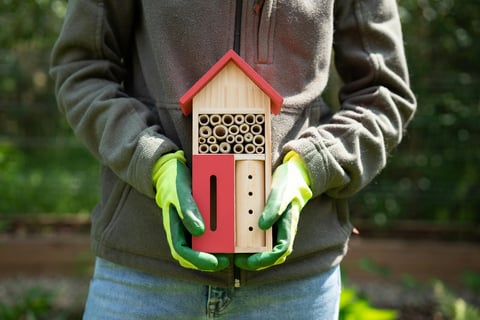The Evolution of Luxury in a Conscious Era
The luxury industry, known for its exclusivity, craftsmanship, and prestige, has long set standards for quality. However, as global awareness of climate change, environmental degradation, and social justice grows, luxury is being redefined. Enter "sustainable luxury" – a movement that aligns opulence with ecological responsibility, ethical practices, and long-term sustainability. Today, in India, sustainable luxury is evolving from a niche concept into a new gold standard for brands and consumers alike. It’s no longer enough for luxury to simply look good; it must also do good.
D'LUX
Team BANI
10/28/20246 min read


Sustainable luxury is the harmonious blending of high-end quality with ethical and environmental mindfulness. It means creating products and experiences that satisfy luxury demands – exquisite craftsmanship, exclusivity, premium materials – while minimising environmental impact and enhancing social equity. For the discerning Indian consumer, sustainable luxury represents a choice to invest in items and experiences that reflect personal values alongside refinement.
Why Sustainable Luxury Is Gaining Ground in India ?
India’s unique blend of traditional craftsmanship, cultural richness, and growing environmental consciousness makes it fertile ground for sustainable luxury. More Indian consumers are embracing eco-consciousness, reflecting a shift toward sustainable lifestyles in everything from fashion and home decor to travel and wellness. For many, luxury is no longer simply about status but about making a responsible statement – and sustainable luxury allows them to do just that.
In parallel, the Indian government has ramped up its sustainability efforts through initiatives like the “Green India Mission” and “Swachh Bharat,” fostering an environment that encourages industries to adopt greener practices. As a result, both Indian luxury brands and global names are recognising the demand for ethical luxury options in the Indian market.
The Elements of Sustainable Luxury: A Closer Look
To understand what makes luxury sustainable, let’s break down the core pillars that define this growing movement and the brands leading the way:
1. Ethical Sourcing and Fair Labour Practices
Ethical luxury begins with transparency in sourcing materials and supporting fair labour practices. From sourcing organic cotton for fashion to using conflict-free gemstones in jewellery, sustainable luxury is deeply tied to responsible supply chains.
Amrapali, known for heritage jewellery, has committed to responsible sourcing, especially with gemstones, and supports traditional artisans by providing safe working conditions.
Chopard, a global luxury jewellery brand, champions fair-mined gold and has integrated responsibly sourced materials across its collections. Their “Journey to Sustainable Luxury” is an ongoing mission, bringing ethical materials to high-end jewellery.
2. Eco-Friendly Materials and Design
Sustainable luxury thrives on using materials that minimise environmental impact. Think organic fabrics, recycled metals, eco-leather, and plant-based dyes. Brands also focus on creating timeless designs that don’t follow fast-changing trends but rather carry lasting aesthetic appeal.
Anita Dongre is known for her use of organic, handwoven fabrics, supporting rural artisans, and conserving natural resources through her collections.
Stella McCartney has made sustainability her brand’s ethos, pioneering cruelty-free, eco-conscious fashion by using recycled fabrics and eco-friendly dyeing processes. Her collections showcase that sustainable design can be both stylish and luxurious.
3. Innovative Craftsmanship and Limited Production
Sustainable luxury brands often prioritise quality over quantity. Limited production runs not only keep products exclusive but also reduce waste. Furthermore, innovation in craftsmanship ensures that luxury products are durable and do not need frequent replacement, lessening the impact on resources.
Good Earth exemplifies Indian heritage combined with sustainable practices, creating lifestyle and decor pieces built to last and imbued with traditional artistry.
Hermès, though synonymous with luxury, has committed to crafting products designed for longevity, investing in artisanal skill and limited, timeless designs rather than mass-produced items.
4. Green Packaging and Circular Economy Initiatives
Packaging is one of the most visible aspects of a luxury purchase, and sustainable brands are rethinking how they present their products. Reusable, recyclable, or compostable packaging is fast becoming the norm, with some brands even incentivising customers to return packaging for reuse.
Kama Ayurveda, a prominent Indian luxury skincare brand, is committed to eco-friendly glass packaging, with a circular approach to reducing single-use plastics.
Cartier has introduced green packaging across its line, aiming for 100% recyclable materials in all its product packaging, showcasing a strong commitment to environmental responsibility.
5. Purpose-Driven Experiences and Community Engagement
Sustainable luxury isn’t limited to products; it also extends to experiences. From eco-friendly resorts to wellness retreats that support local communities, luxury travel and lifestyle experiences are being reshaped to ensure they enrich the environment and the people.
SwaSwara in Karnataka offers wellness experiences rooted in sustainability, supporting local communities and artisans while creating immersive eco-conscious retreats.
Six Senses Resorts, known globally for their eco-tourism efforts, are designed to blend into their natural surroundings. Their Indian properties embrace sustainability through organic produce sourcing, eco-friendly building materials, and energy-saving initiatives.
Sustainable Luxury in the Fashion Industry: A Stylish Evolution
Fashion is one of the most vibrant arenas of sustainable luxury. With its legacy of rich textiles, diverse weaves, and skilled artisans, India has a unique advantage in producing sustainable fashion that celebrates heritage and modern style. Many Indian designers are stepping up, focusing on zero-waste production methods, eco-friendly textiles, and handwoven fabrics, helping the country’s fashion industry embrace a more circular, less wasteful approach.
Key Brands Leading the Sustainable Fashion Movement in India:
Ritu Kumar: Known for her revival of Indian textiles, Kumar incorporates organic materials and collaborates with artisans, creating pieces that honour India’s heritage.
Ka-Sha by Karishma Shahani Khan: This brand focuses on upcycling and using sustainable materials, with each piece crafted thoughtfully to reduce waste.
Nicobar: The brand champions sustainable clothing and home decor items, crafted using natural materials and low-impact dyes, presenting luxury as both stylish and sustainable.
Vivienne Westwood, while based in the UK, has been a pioneer in sustainable fashion, inspiring global brands with her stance on reducing the industry’s carbon footprint through recycled fabrics and sustainable materials.
Sustainable Luxury Beyond Fashion: Travel, Beauty, and Real Estate
Luxury extends far beyond fashion, touching industries like travel, beauty, and real estate, all of which are transforming to meet the growing demand for sustainable luxury in India.
Luxury Travel with a Green Footprint
Eco-tourism and sustainable luxury accommodations have seen significant growth, with high-end resorts and hotels adopting green initiatives. In destinations like the Western Ghats and Kerala, boutique properties focus on organic farms, rainwater harvesting, and minimal-impact architecture.
Taj Hotels have led the way in India with their "EARTH" initiative, which integrates sustainability at every level through solar power, water conservation, and waste reduction. This provides affluent travellers with an opportunity to enjoy luxurious stays while being mindful of the environment.
The Rise of Eco-Friendly Beauty
The beauty industry is embracing natural ingredients, recyclable packaging, and cruelty-free testing. Indian consumers, long accustomed to Ayurvedic and herbal beauty traditions, are increasingly favouring brands that offer luxury with nature-friendly values.
Forest Essentials has become a prominent name in luxury skincare by using sustainably sourced ingredients and traditional Ayurvedic formulations, blending luxury with environmental mindfulness.
Lush, though international, has a strong presence in India and uses natural, cruelty-free ingredients, packaged minimally, often in compostable or recyclable containers.
Sustainable Real Estate and Interior Design
In real estate, sustainable luxury translates to green architecture, energy-efficient systems, and materials that are both durable and environmentally friendly. Luxury housing projects in urban hubs like Delhi, Mumbai, and Bengaluru are integrating sustainable practices, appealing to affluent clients who value eco-friendly living.
Godrej Properties has been at the forefront of sustainable real estate in India, incorporating green buildings, rainwater harvesting systems, and energy-efficient technologies into their luxury residential and commercial projects.
Luxury Reimagined for a Sustainable Tomorrow
Sustainable luxury is reshaping how we perceive affluence, blending opulence with purpose. In India, where heritage and modernity intersect, the sustainable luxury movement reflects a profound cultural shift towards responsibility and ecological respect. Embracing sustainable luxury is not just a trend but a commitment to a future where elegance, ethical values, and environmental consciousness thrive together.
The choice to invest in sustainable luxury is more than just purchasing a product; it’s making a statement. It’s about choosing pieces, experiences, and brands that are not only exquisite but carry forward a legacy of respect – respect for the artisans, respect for nature, and respect for the discerning individuals who choose to create a positive impact through their lifestyle.








BANI
An Interview Based Premium Quarterly Magazine That Ignites Your Dreams, Passions and Aspirations
CONNECT WITH US
SUBSCRIBE
© 2024. All rights reserved.
Voice For Change
SECTIONS
WINGS
QUICK LINKS
CONTACT INFORMATION
emagofficial@baniskg.in
